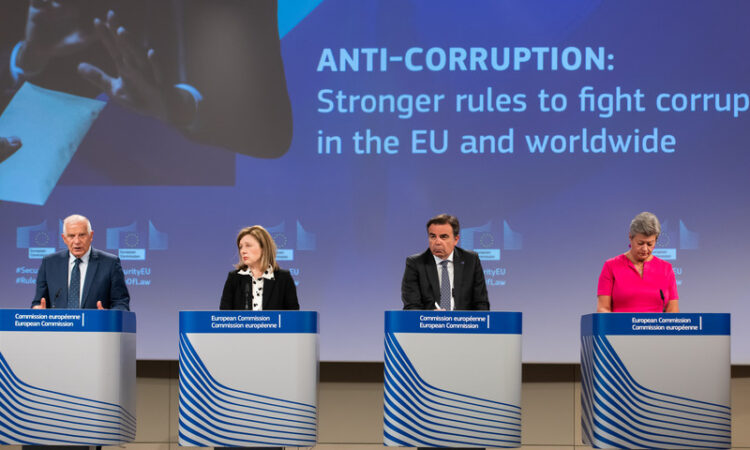
The EU Commission on Wednesday (3 May) presented proposals to harmonise and tighten anti-corruption rules, in an effort to crack down on crossborder graft and mitigate its erosion of democracy.
“Corruption is like a cancer. […] Corruption is killing our democracy, killing the trust of people in democratic institutions,” EU commissioner Věra Jourová told reporters.
Under the proposed rules, EU countries would need to adhere to minimum requirements to ensure “that privileges and immunity can be lifted during corruption investigations” and that police and prosecutors “have appropriate investigative tools to fight corruption”.
A 2022 Eurobarometer survey showed 68 percent of citizens across the EU believed corruption was widespread in their country.
Only about a third of people had trust in anti-corruption efforts, Jourová said, adding that 40 percent of respondents think that it is useless to report corruption, because they do not think they would be properly investigated.
The overhaul “will raise the bar for EU-wide definitions and penalties of corruption crimes and will help authorities to catch and punish the criminals, be it from [the] public or private sector,” she said — adding that criminals take advantage of loopholes left by the different definitions of corruption in member states.
“At least 60 percent of organised criminal groups active in the EU use corruption as a regular tactic,” home affairs commissioner Ylva Johansson told reporters.
EU countries would need to adapt their criminal codes to harmonise definitions of corruption crimes beyond bribery, to include: misappropriation, abuse of office, obstruction of justice in corruption, and illicit enrichment. Illicit enrichment is an offence in only eight EU states, for example.
Under the proposal, EU countries would be required to have an anti-corruption agency.
Last year, the EU’s own European Parliament was rocked by a major corruption scandal involving World Cup host Qatar.
The EU and the parliament has tried to showcase efforts to crack down on corruption ahead of the European elections in May 2024. The new measures proposed on Wednesday are not particularly aimed at EU institutions.
Commission officials said they hoped that the new rules can come into force before the EU-wide parliament election due in a year.
Jourová said she would present her proposal later this month for a new dedicated ethics body to cover nine EU institutions including the parliament to set standards on accepting gifts and trips, and declaring assets.
Corrupt foreigners
The commission also unveiled proposals to establish rules for reporting and verifying assets and conflicts of interests in the public sector, as well as contacts with the private sector. Public procurement as well as investor residence and citizenship schemes are among areas particularly at risk.
The proposal would also create a dedicated sanctions blacklist for foreigners deemed corrupt.
“Based on this framework, the EU could ban perpetrators of corruption from entering the EU to freeze perpetrators’ assets in the EU and any EU person from making funds and economic resources available to perpetrators,” EU foreign affairs chief Josep Borrell said.
Those on the list would be barred from traveling to the EU and would have their assets held in the EU frozen in a policy similar to the US Magnitsky Act.
The plans on corruption sanctions against third countries will also have to be approved by EU governments.






